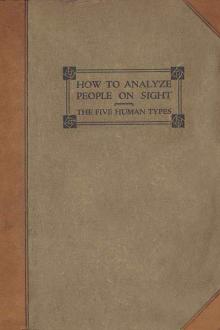How to Analyze People on Sight - Elsie Lincoln Benedict (e novels for free .txt) 📗

- Author: Elsie Lincoln Benedict
- Performer: -
Book online «How to Analyze People on Sight - Elsie Lincoln Benedict (e novels for free .txt) 📗». Author Elsie Lincoln Benedict
Uses His Head
¶ Just as assimilation is the favorite activity of the Alimentive type, head work is the favorite activity of the large-headed Cerebral. He is so far removed, evolutionally, from the stomach stage that his stomach is as much a remnant with him as the brain is a rudiment with the extreme Alimentive.
The extra blood supply which nature furnishes to any over-developed part of the body also tends to encourage him in thinking, just as the same condition encourages the fat man in eating.
¶ An Alimentive never forgets dinner time.
But the Cerebral is so much more interested in food for his brain than food for his body that he can go without his meals and not mind it. He is likely to have a book and a cracker at his meals—and then forget to eat the cracker!
¶ We are "mental" in proportion to the sensitiveness of our mental organization. The Cerebral possesses the most highly developed brain center of any type and is therefore more sensitive to all those stimuli which act upon the mind.
His whole body bespeaks it. The fineness of his features is in direct contrast to some of the other types. The unusual size of his brain denotes a correspondingly intricate organization of nerves, for the nerves are tiny elongations of the brain.
The intellectual sensitiveness of any individual can be accurately estimated by noting the comparative size of his brain and body.
¶ A triangle is the geometrical figure approximated by the Cerebral's front face and head.
If he is a pure, extreme Cerebral a triangle is again what you are reminded of when you look at his head from the side, for his head stands on a small neck, his forehead stands out at the top, while his back head is long. These bring the widest part of his head nearer the top than we find it in other types.
¶ A thin, delicate hand denotes a larger-than-average Cerebral element. (See Chart 10)
¶ What have long been known as "smooth fingers" are typical of the Cerebral. These are not to be confused with the fat, pudgy babyish fingers of the Alimentive, for though the latter's fingers are smooth around, they do not present straight outlines at the sides. They puff out between the joints.
Smooth fingers are characteristic of the extreme Cerebral type. They are called this because their outlines run straight up and down.
The joints of the Alimentive finger (See Chart 2) mark the narrowest places owing to the fact that the joints are not changeable. In the Osseous fingers (See Chart 8) the opposite is true. The joints mark the widest spots and the spaces between are sunken.
The fingers of the Thoracic are inclined to be pointed like his head, while the Muscular's fingers are square at the end and look the power they possess.
¶ But the Cerebral has fingers unlike any of these. There is no fat to make them pudgy and no muscle to make them firm. Neither are there large joints to make them knotty. Their outlines therefore run in almost straight lines and the whole hand presents a more frail, aesthetic appearance.
¶ Thinking, contemplating, reflecting—all the mental processes coming under the head of "meditation"—constitute the keynote of this type.
The Alimentive lives to eat, the Thoracic to feel, the Muscular to act, the Osseous to stabilize, but the Cerebral lives to meditate.
¶ He loves to plan, imagine, dream day-dreams, visualize and go over and over in his mind the manifold possibilities, probabilities and potentialities of many things.
When he carries this to extremes—as the person with a huge head and tiny body is likely to do—he often overlooks the question of the practicability of the thing he is planning. He inclines to go "wild-catting," to dream dreams that are impossible of fruition.
¶ He will sit by the hour or by the day thinking out endless ultimates, for the sheer pleasure it gives him. Other men blame him, criticise him and ridicule him for this and for the most part he does fail of the practical success by which the efficient American measures everything.
But the fact must never be forgotten that the world owes its progress to the men who could see beyond their nose, who could conceive of things no one had ever actually seen.
This type, more than any other, has been the innovator in all forms of human progress.
¶ "Everything accomplished starts with the dream of it," is a saying we all know to be true. Yet we go on forever giving all the big prizes to the doers. But the man who can only dream lives in a very hostile world. His real world is his thoughts but whenever he steps out of them into human society he feels a stranger and he is one.
¶ The world of today is ruled by people who accomplish. "Putting it over," "delivering the goods," "getting it across," are a part of our language because they represent the standards of the average American today.
The Cerebral is as much out of place in such an environment as a fish is on dry land. He knows it and he shows it. He doesn't know what the other kind are driving at and they know so little of what he is driving at that they have invented a special name for him—the "nut."
Doing isn't his line. He prefers the pleasures of "thinking over" to all the "putting over" in the world. This type usually is a failure because he takes it all out in dreaming without ever doing the things necessary to make his dream come true.
¶ These predilections for overlooking the obvious, the tangible and the necessary elements in everyday existence tend to make of the Cerebral what he is so often called—a "visionary."
For instance, he will build up in his mind the most imposing superstructure for an invention and confidently tell you "it will make millions," but forget to inform himself on such essential questions as "will it work?" "Is it transportable?" or "Is there any demand for it?"
¶ "He was born ahead of his time" applies oftenest to a man of this type.
He has brains to see what the world needs and not infrequently sees how the world could get it. But he is so averse to action himself that unless active people take up his schemes they seldom materialize.
¶ Men in whom the Cerebral type predominated anticipated every step man has made in his political, social, individual, industrial, religious and economic evolution. They have seen it decades and sometimes centuries in advance. But they were always ridiculed at first.
¶ History is replete with the stories of unappreciated genius. In Washington, D. C., you will have pointed out to you a great elm, made historic by Samuel Morse, inventor of the telegraph. He could not make the successful people of his day give him a hearing, but he was so wrapped up in his invention that he used to sit under this tree whenever the weather permitted, and explain all about it to the down-and-outers and any one else who would stop. "Listen to the mutterings of that poor old fool" said the wise ones as they hurried by on the other side of the street. But today people come from everywhere to see "The Famous Morse Elm" and do homage to the great mind that invented the telegraph.
¶ Today we fly from continent to continent and air travel is superseding land and water transportation whenever great speed is in demand. A man receives word that his child is dangerously ill; he steps into an airplane and in less than half the time it would take trains or motors to carry him, alights at his own door.
Commerce, industry, war and the future of whole nations are being revolutionized by this man-made miracle. Yet it is but a few short years since S. P. Langley was sneered at from one end of this country to the other because he stooped to the "folly" of inventing a "flying machine."
¶ Alexander Graham Bell invented the telephone. But it was many years before he could induce anybody to finance it, though some of the wealthiest, and therefore supposedly wisest, business men of the day were asked to do so. None of them would risk a dollar on it. Even after it had been tested at the Centennial Exposition in Philadelphia and found to work perfectly, its possibilities were so little realized that for a long while no one could be found to furnish the funds necessary to place it upon the market.
¶ Then after the world had become accustomed to transacting millions of dollars worth of business daily over the once despised telegraph and telephone it took out its doubts on Marconi and his "wireless telegraphy." "It's impossible," they said. "Talk without wires? Never!"
But now the radio needles pierce the blue from San Diego to Shanghai and from your steamer in mid-ocean you can say good night to your loved one in Denver.
¶ Ideas always have to go begging at first, and the greater the idea the rougher the sledding.
The most successful play ever put on in America was "Lightnin'," written by Frank Bacon, a typical Cerebral-Osseous. It ran every night for three years in New York City. It has made a million people happy and a million dollars for its sponsors. But when Mr. Bacon, who also plays the title role, took it to the New York producers they refused it a try-out. But because he had faith in his dream and persisted, his name and his play have become immortal.
¶ The ideal combination is a dreamer who can DO or a doer who knows the power of a DREAM. Thinking and acting—almost every individual is doing too much of one and too little of the other!
¶ The world is divided roughly into these two classes: those who act without thinking (and as a result are often in jail); and those who think without acting (and as a result are often in the poorhouse).
¶ To be a successful individual today you have got to dream and then DO; plan and then PRODUCE; contemplate and then CONSTRUCT; think it out and then WORK it out.
If you do the latter at the expense of the former you are doomed to work forever for other people, to play some other man's game. If you do the former at the expense of the latter you are doomed to know only the fringes of life, never to be taken seriously and never to achieve.
¶ If you are inclined to take your pleasure out in cerebrating instead of creating; if it suffices you to see a thing in your imagination whether it ever comes to pass or not, you are at a decided disadvantage in this hustling world; and you will never be a success.
¶ On the other hand if you are content to do what other men dream about and never have dreams of your own you will probably always have a berth but will never have a million.





Comments (0)